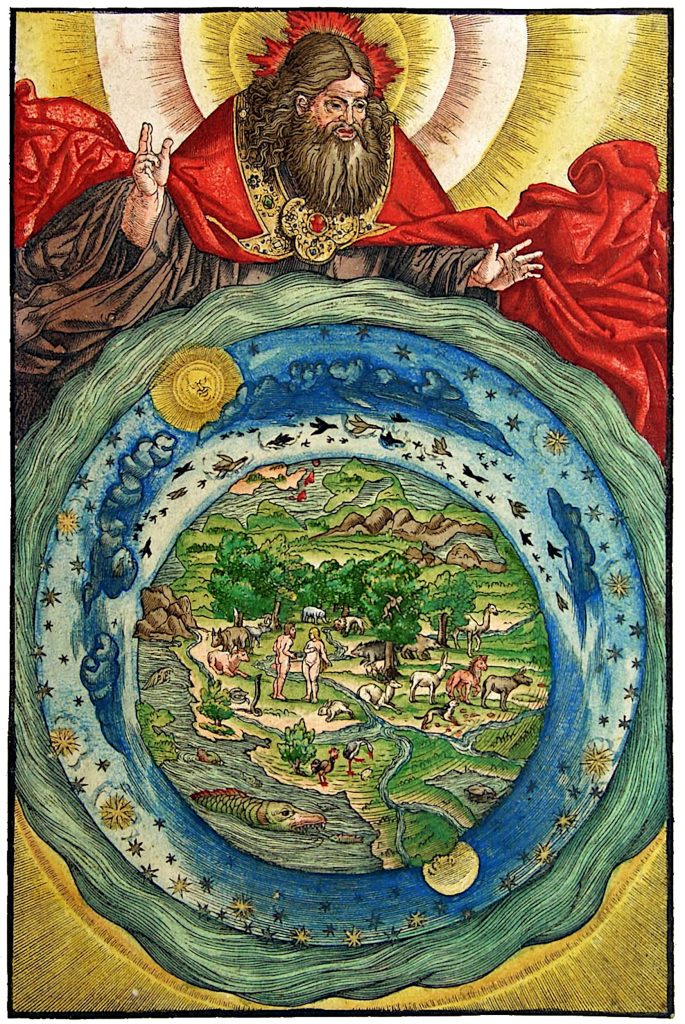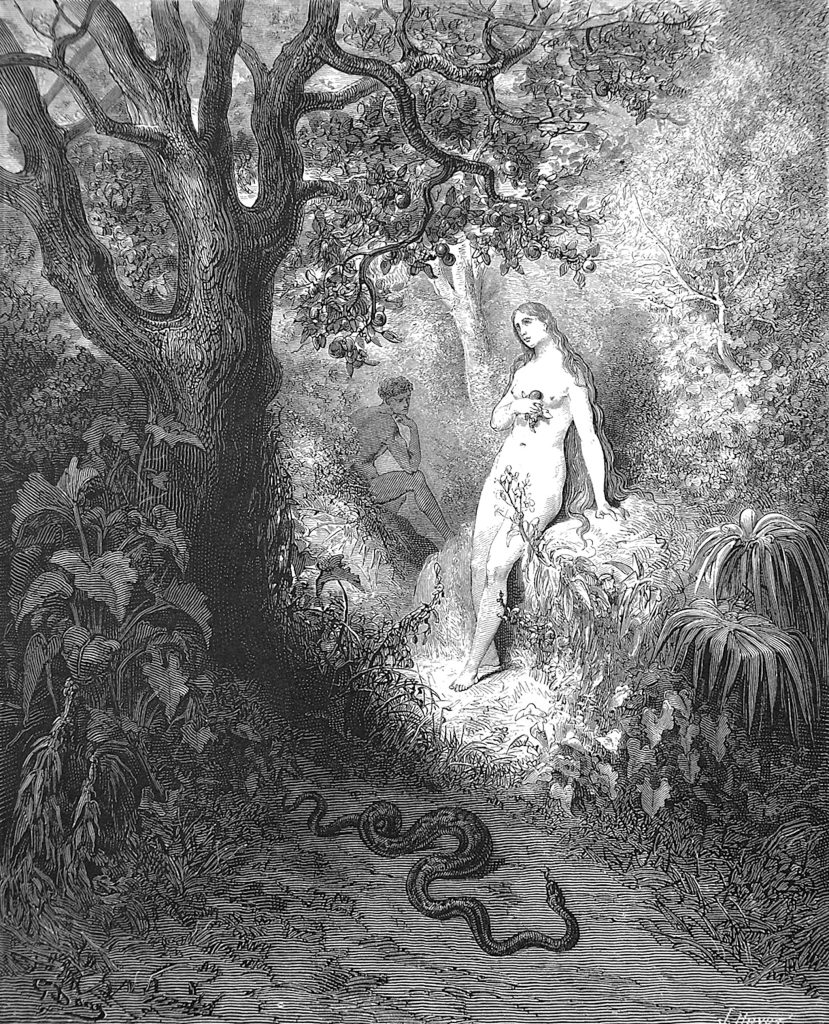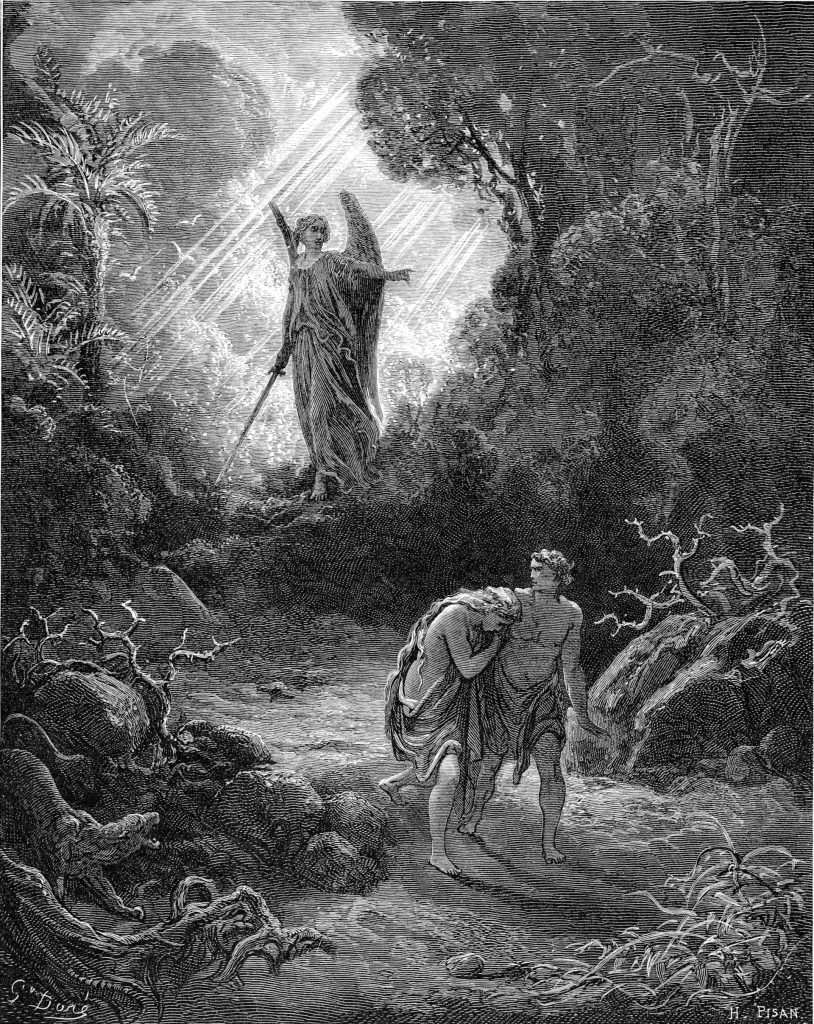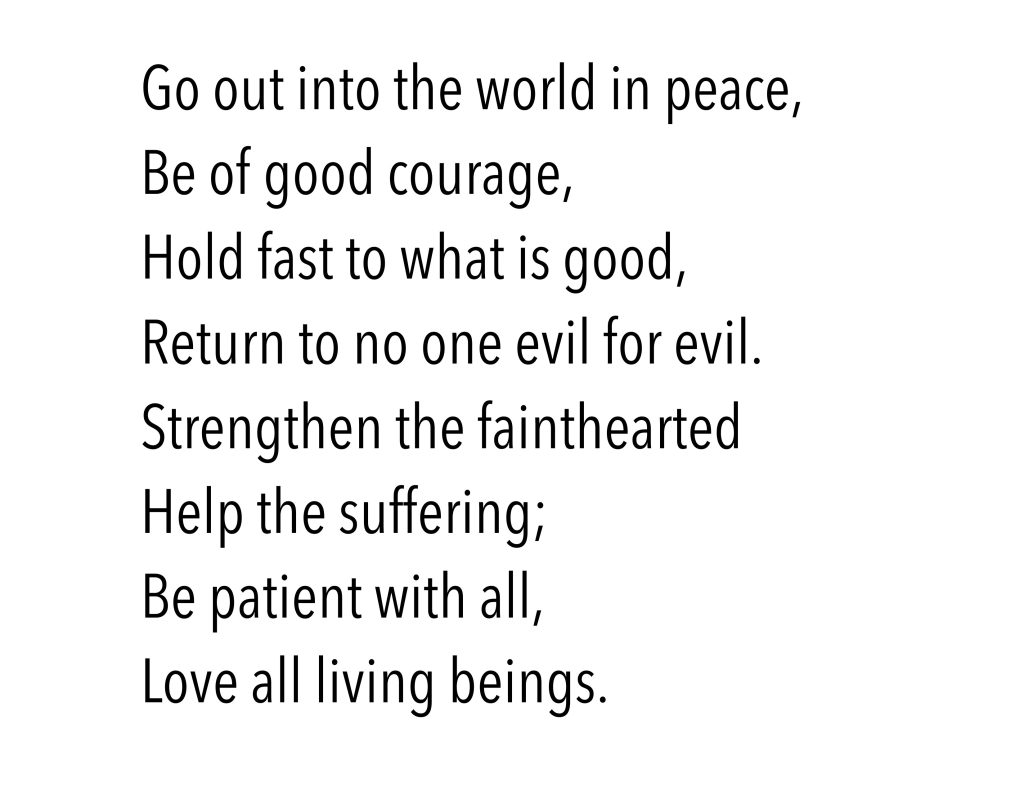Beginnings: Myths and stories from world religions
A curriculum for upper elementary grades by Dan Harper
Copyright (c) 2014, 2024 Dan Harper.
Back to Table of Contents | On to Session 6

The Garden of Eden: A Story from the Ancient Near East
Please see the “Important notes to adults” at the end of this lesson plan!
This story tells the beginnings of the heavens and the earth, when they were created.
In the day that Yahweh made the earth and the heavens, when no plant of the field was yet in the earth and no herb of the field had yet sprung up — for Yahweh had not caused it to rain upon the earth, and there was no one to till the ground; but a stream would rise from the earth, and water the whole face of the ground — then Yahweh formed a man (in Hebrew, “formed a man” is said adam), from the dust of the ground (which in Hebrew is said adamah). Yahweh breathed into the man’s nostrils the breath of life, and the man became a living being.
And Yahweh planted a garden in Eden, in the east; and there he put the man whom he had formed. Out of the ground Yahweh made to grow every tree that is pleasant to the sight and good for food, the tree of life also in the midst of the garden, and the tree of the knowledge of good and evil.
A river flows out of Eden to water the garden, and from there it divides and becomes four branches. The name of the first is Pishon; it is the one that flows around the whole land of Havilah, where there is gold; and the gold of that land is good; and there are precious stones there. The name of the second river is Gihon; it is the one that flows around the whole land of Cush. The name of the third river is Tigris, which flows east of Assyria. And the fourth river is the Euphrates.
Yahweh took the man and put him in the garden of Eden to till it and keep it (the name “Eden” means “pleasure and delight”). And Yahweh commanded the man, “You may freely eat of every tree of the garden; but of the tree of the knowledge of good and evil you shall not eat, for in the day that you eat of it you shall die.”
Then Yahweh said, “It is not good that the man should be alone; I will make him a helper as his partner.” So out of the ground Yahweh formed every animal of the field and every bird of the air, and brought them to the man to see what he would call them; and whatever the man called every living creature, that was its name. The man gave names to all cattle, and to the birds of the air, and to every animal of the field; but for the man there was not a helper to be his partner.
So Yahweh caused a deep sleep to fall upon the man, and he slept. Then Yahweh took one of the man’s ribs out, and closed up its place with flesh. Yahweh made the rib that had been taken from the man into a female human being, a woman, and brought her to the man.
The man said, “This at last is bone of my bones and flesh of my flesh; this one shall be called Woman (which in Hebrew is said ishshah), for out of a man (which is Hebrew is said ish) this one was taken.”
Therefore a man leaves his father and his mother and clings to his wife, and they become one flesh. And the man and his wife were both naked, and were not ashamed.
Now the serpent was more crafty than any other wild animal that Yahweh had made. He said to the woman, “Did Yahweh say, ‘You shall not eat from any tree in the garden’?”
The woman said to the serpent, “We may eat of the fruit of the trees in the garden; but Yahweh said, ‘You shall not eat of the fruit of the tree that is in the middle of the garden, nor shall you touch it, or you shall die.'”
But the serpent said to the woman, “You will not die; for Yahweh knows that when you eat of it your eyes will be opened, and you will be like Yahweh, knowing good and evil.”

So when the woman saw that the tree was good for food, and that it was a delight to the eyes, and that the tree was to be desired to make one wise, she took of its fruit and ate; and she also gave some to her husband, who was with her, and he ate. Then the eyes of both were opened, and they knew that they were naked; and they sewed fig leaves together and made loincloths for themselves.
They heard the sound of Yahweh walking in the garden at the time of the evening breeze, and the man and his wife hid themselves from the presence of Yahweh among the trees of the garden.
But Yahweh called to the man, and said to him, “Where are you?”
The man said, “I heard the sound of you in the garden, and I was afraid, because I was naked; and I hid myself.”
Yahweh said, “Who told you that you were naked? Have you eaten from the tree of which I commanded you not to eat?”
The man said, “The woman whom you gave to be with me, she gave me fruit from the tree, and I ate.”
Then Yahweh said to the woman, “What is this that you have done?”
The woman said, “The serpent tricked me, and I ate.”
Yahweh said to the serpent, “Because you have done this, cursed are you among all animals and among all wild creatures; upon your belly you shall go, and dust you shall eat all the days of your life. I will put enmity between you and the woman, and between your offspring and hers; he will strike your head, and you will strike his heel.”
To the woman, Yahweh said, “I will greatly increase your pangs in childbearing; in pain you shall bring forth children, yet your desire shall be for your husband, and he shall rule over you.”
And to the man, Yahweh said, “Because you have listened to the voice of your wife, and have eaten of the tree about which I commanded you, ‘You shall not eat of it,’ cursed is the ground because of you; in toil you shall eat of it all the days of your life; thorns and thistles it shall bring forth for you; and you shall eat the plants of the field. By the sweat of your face you shall eat bread until you return to the ground, for out of it you were taken; you are dust, and to dust you shall return.”
The man named his wife Eve, because she was the mother of all living (in Hebrew, “Eve” resembles the word for living). And Yahweh made garments of skins for the man and for his wife, and clothed them.
Then Yahweh said, “See, the man has become like one of us, knowing good and evil; and now, he might reach out his hand and take also from the tree of life, and eat, and live forever.”
Therefore Yahweh sent the man forth from the garden of Eden, to till the ground from which he was taken. He drove out the man; and at the east of the garden of Eden he placed the cherubim, who were angelic guardians of fearsome appearance, wielding swords that flamed and turned to guard the way to the tree of life.

Source:
The King James and New Revised Standard Versions of the Bible, altered, Genesis 2.4-3.24.
Session Five: The Garden of Eden
Please see the “Important notes to adults” at the end of this lesson plan!
Materials
None.
I/ Opening
Take attendance.
Light chalice with these words and the associated hand motions: “We light this chalice to celebrate Unitarian Universalism: the church of the open mind, the helping hands, and the loving heart.”
Check-in: Go around circle. Each child and adult says his or her name, and then may say one good thing and one bad thing that has happened in the past week (anyone may pass).
II/ Read the story
Read “The Garden of Eden.”
Please see the “Important notes to adults” at the end of this lesson plan!
III/ Act out “The Garden of Eden.”
Ask: “What happened first in the story? Then what happened? then what happened?” — and so on, until (with your help and prompting as needed) the children have remembered what happened in the story.
Determine where the stage area will be. Children who are not actors may sit facing the stage area.
The lead teacher reads the story, prompting actors as needed to act out their parts. The lead teacher may wish to simplify the story on the fly, to make it easier to act out.
Be sure to take photos of the skits, and print them out to be posted on the class bulletin board next week.
Please see the “Important notes to adults” at the end of this lesson plan!
IV/ Conversation
Here are some questions which you might use to start a brief conversation:
Did Yahweh tell the truth when he said that the humans would die if they ate from the fruit on the trees?
Did the Serpent really trick Eve, or did he tell her the truth about the apples? Or did he both trick her, and tell the truth?
Many times, people have to make decisions when they don’t have all the information they need to make the decision. When Eve had to decide whether or not to eat the fruit from the tree, she didn’t really know who was telling the truth — Yahweh, or the Serpent. Do you think she made a good decision, based on what she actually knew?
Please see the “Important notes to adults” at the end of this lesson plan!
V/ Free play
Ideas for free play: “Duck, Duck, Goose” (yes, older kids find this game amusing); walk to front play area or labyrinth (if time); etc.
VI/ Closing circle
Before leaving, have the children sit or stand in a circle.
When the children are in a circle, ask them what they did today, and prompt them with questions and answers. If any parents have come to pick up their children, invite them to join the circle (so they can know what it is their children learned about this week).
After you’ve reviewed what the children learned for a couple of minutes, say together some closing words, either the ones below or something you choose. Tell the children how you enjoyed seeing them (if that’s true), and that you look forward to seeing them again next week.
Go out into the world in peace,
Be of good courage,
Hold fast to what is good,
Return to no one evil for evil.
Strengthen the fainthearted
Help the suffering;
Be patient with all,
Love all living beings.

LEADER RESOURCE
Important notes for adults
This story carries so much baggage in our culture! But we can read this story in a new way — as feminists (girls and women are just as good as any gender; God is not just male), as Universalists and process theologians (God may be all-loving, but has some things to learn), and as environmentalists (snakes are not evil).
1. Eve was smart and good
Our culture tends to accept this story without question — that is, we tend to accept the usual interpretation of the story, that Eve did wrong.
But when you consider that Yahweh did not tell the truth — because humans did not die when they ate the fruit from the trees — it can look as though Eve was set up for failure.
Such an interpretation can lead us to question whether God in the Bible is omnibenevolent, omnipotent, and omniscient — all good, all powerful, and all knowing. Unitarian theologian Charles Hartshorne published a book titled Omnipotence and Other Theological Mistakes, in which he argues that the God of the Bible is not all knowing. It is a mistake to say that God is omnipotent, and there are plenty of counter-examples in the Bible to show that God is no all knowing. In fact, Hartshorne says, God changes and grows (and perhaps becomes more mature) over the time span of the stories in the Bible.
If God is not all knowing, then we could argue that God unintentionally gave Eve incorrect information about the fruit on the tree. Whereas the serpent had more accurate information: the serpent knew that the fruit would not kill the humans. Eve listened to both sources of information, and chose the one she thought was more accurate — and she turned out to be correct.
2. The god of Genesis could be both male and female
Although the Bible refers to Yahweh/Elohim using a male pronoun, there is strong evidence that the god of Genesis has both male and female characteristics. In the book of Genesis, chapter 1 verse 27 (just before the story of the Garden of Eden), it says:
“So God created humankind in his image, in the image of God he created them; male and female he created them.”
Since both the male and female human are created in the image of God, this implies that the God of Genesis has both male and female characteristics.
Note, too, that in this version of the creation of humans, Eve is not created from a piece of Adam.
All this could be important to bring out when discussing this story with the children.
3. In the Bible, the serpent is not “Satan”
In the English-speaking world, the notion that the serpent is Satan comes to us primarily from the book Paradise Lost by John Milton. But Paradise Lost is merely one person’s interpretation of the Bible.
Universalists have long held that Satan does not actually appear in the Bible. They argue that the character of Satan was invented long after the Bible was written.
If the serpent in this story isn’t Satan, then the serpent is just a snake. And snakes are not evil. From an ecological viewpoint, this is an important point to make with the children — snakes aren’t bad.